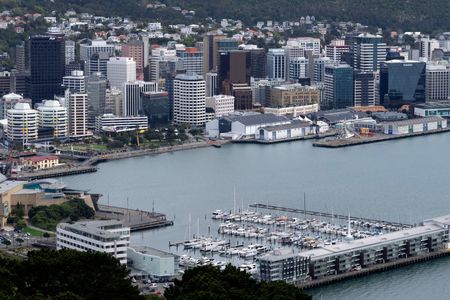By Lucy Craymer
WELLINGTON (Reuters) -New Zealand’s business confidence in the third quarter worsened as inflation pressures ticked up, a private think tank said on Tuesday.
A net 18% of firms surveyed expected general business conditions to improve compared with 22% optimism in the previous quarter, the New Zealand Institute of Economic Research’s (NZIER) quarterly survey of business opinion showed.
Christina Leung, principal economist at NZIER, told a press conference that even though businesses are expecting better times for both their own businesses and the broader economy, they remain cautious when it comes to hiring, investment and overall cost and pricing.
On a seasonally adjusted basis, 15% expected business conditions to improve versus 26% optimism recorded in the previous period. The survey’s measure of capacity utilization fell to 89.1%, from the previous quarter’s 89.4%.
The survey noted that cost and pricing indicators suggest an intensifying of inflation pressures in the third quarter with a net 11% of firms reporting they had raised prices. In the previous quarter a net 1% of firms reported they had reduced prices.
Leung added the survey suggests economic growth in the third quarter was unchanged, with the potential that there was a small contraction in growth.
New Zealand’s economy contracted 0.9% in the second quarter and has shrunk in three of the last five quarters.
Weakness in the economy will support the idea that the central bank will cut the cash rate further at its meeting on Wednesday. The Reserve Bank of New Zealand has indicated it will cut the cash rate, currently at 3.0% by 50 basis points before the end of the year.
A Reuters poll sees the central bank cutting the cash rate by 25 basis points when it meets on Wednesday, but several economists expect the bank to cut the cash rate by 50 basis points.
Leung added NZIER’s core view is that the central bank will cut the cash rate by 25 basis points but if they were leaning towards a 50-basis-point cut, “I don’t think there is anything in here that would stop them.”
(Reporting by Lucy Craymer in Wellington; Editing by Lincoln Feast.)










